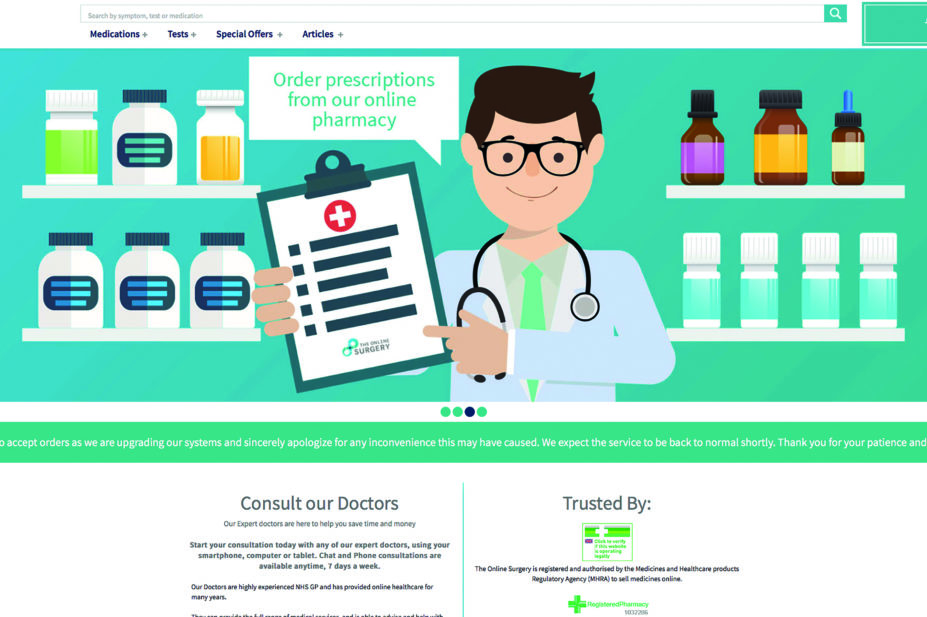
theonlinesurgery.co.uk
The Care Quality Commission (CQC) has suspended the registration of a website selling prescription medicines and taken action against three others amid fears that adequate checks were not being carried out before the medicines were dispensed, putting patient safety at risk.
Since the beginning of 2017, the CQC, the independent regulator of all health and social care services in England, has published inspection reports on a total of six websites, all of which have had action taken against them or have voluntarily deregistered.
Concerns in the regulator’s reports include patients being put at risk through insufficient identity checks being carried out, poor recording of medical history, prescription of inappropriate medications and patients’ own GPs not being informed of the prescription.
In the CQC’s latest inspection reports, published on 6 April 2017, Doctor Matt Ltd – trading as theonlinesurgery.co.uk – was revealed to have had its registration suspended until the end of June 2017 after it was found to be taking as little as 17 seconds to review patient questionnaires.
The CQC found that not all prescriptions were issued by Doctor Matt Ltd as a result of a structured questionnaire because patients could request a ‘bespoke’ prescription, yet there was no list of medicines which had been assessed as safe for remote prescribing.
“There were examples of patients needing further assessment and not being referred to the appropriate service,” the report said. On 5 April, Doctor Matt Ltd published a notice on its website saying that it was unable to accept orders as it was upgrading its system.
Frosts Pharmacy Ltd – which was issued with warning notices by the CQC – was found to be prescribing large quantities of inhalers without checking whether patients had a confirmed asthma diagnosis, or whether their condition was out of control. The company trades as oxfordonlinepharmacy.co.uk.
White Pharmacy Ltd (whitepharmacy.co.uk), which had conditions attached to its registration, was found prescribing a high volume of opioid-based medicines with no system to confirm patients’ medical or prescribing histories.
A fourth website – i-GP Ltd, trading as i-gp.uk – was issued with requirement notices, compelling it to make improvements in a number of areas.
The recent inspection reports come as part of the CQC’s efforts to strengthen regulation of online services. A programme of inspection of 46 online services registered in England is ongoing. Last month, MD Direct, which traded as assetchemist.co.uk, voluntarily cancelled its registration and another HR Healthcare Ltd (treated.com) had its registration suspended by the CQC following earlier inspections.
The CQC, together with the General Pharmaceutical Council, General Medical Council and the Medicines and Healthcare products Regulatory Agency, has reminded website operators of the need to care for people safely and effectively – and told the public to be cautious when considering using online pharmacies.

Source: Care Quality Commission (CQC)
Professor Steve Field, chief inspector of general practice at the CQC, says that online companies have a duty to protect the people who seek their support.
Professor Steve Field, chief inspector of general practice at the CQC, said: “Online companies, and the people working for them, have a duty to protect the people seeking their support. They must follow relevant guidance and best practice to make sure that they know who they are communicating with, how medicines fit in with their medical history, and that their GP is made aware of any prescribing decisions.”
Royal Pharmaceutical Society president Martin Astbury said that the regulatory bodies across the UK should work together to ensure regulation was “not only consistent but robust and effective”.
“Patient safety must be the first priority and it is imperative that the patients and public are assured of receiving quality healthcare wherever and however it is accessed,” he said.
Professor Helen Stokes-Lampard, chair of the Royal College of GPs, said: “We cannot tolerate a laissez-faire attitude towards dispensing of prescription medication; they are not sweets.
“GPs and other prescribers in the community are highly trained to take into account physical, psychological and social factors when treating a patient, and will only prescribe drugs if it suits the unique health needs of the person sitting in front of them,” she said.
“We do understand why patients might think getting their medication online is convenient, but they also need to be confident that these services are safe and follow strict remote prescribing rules outlined by the GMC.”


